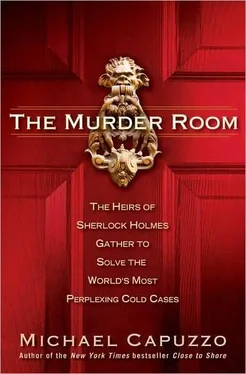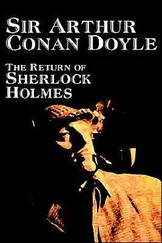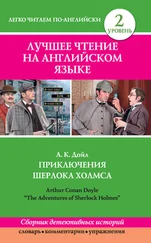Scanlon thought Fleisher was “really shaking up the bushes,” but he didn’t feel he had a case until Cinderella cooperated.
Then, that summer of 1971, the FBI transferred Fleisher to Detroit; he was off the case.
Bender looked up from his coffee. “Man, that’s frustrating. Wow, I would have loved to have met Cinderella. Did you ever get Vorhauer?”
Fleisher scowled. “No. We trailed him all over Boston. He was in a lot of bars, but nothing we could nail down. Then in Detroit I got a call from an agent I’d been working with in Baltimore. He says, ‘Guess what? We got Vorhauer.’ ”
The FBI had received a tip that Vorhauer, a Most Wanted fugitive, was hiding out in Sugarman’s house in suburban Baltimore. Half a dozen FBI agents and police offers went to the house, heavily armed. Sugarman answered the door and let them in. A middle-aged man with red hair was sitting at the kitchen table, an arm’s length from a brown leather briefcase. None of the agents recognized him; they demanded identification. The man’s driver’s license and Social Security number said Joe Smith; his credit cards and club membership said Joe Smith. The last piece of paper in his wallet was a folded-up Western Union receipt documenting money wired to his mother, Barbara Vorhauer, in Hanau, Germany. Vorhauer’s disguise had fooled all of them. Agents arrested the hit man, and brought Sugarman to Boston for questioning. Sugarman flipped immediately to avoid charges of harboring a fugitive.
Bernie Brown paid Vorhauer $5,000 to kill Harbin, Sugarman said. Vorhauer scouted the dancer’s movements and knocked on her door in the evening after a show, the finger man said. She must have thought it was the bellhop with her bucket of ice; Vorhauer pushed his way in. He told Sugarman he stabbed Harbin three times in the heart.
The agents were lucky to arrest the hit man before he reached his brown briefcase. A.22-caliber silencer fired out of the side; there was a ring trigger on the handle. Vorhauer had taken Sugarman into a Baltimore grocery store, said, “Watch this,” and walked down the aisle shooting up the cereal boxes-pfff, pfff, pfff-with the briefcase and walked out calm as a banker on lunch hour. Nobody heard a thing. Vorhauer was a genius, Sugarman said, who created black-market weapons unequaled in the world.
“Vorhauer is a beast,” Bender said. He glanced over his shoulder as if he expected the hit man to be standing there. “That’s what I thought. He’s brilliant and he’s a psychopath. This will really help the bust.” He shifted uneasily in his seat.
Fleisher shook his head sadly. “We never did get him. Murder charges were never filed against Vorhauer. There wasn’t enough corroboration, and they let him go. We all have cases we wish we could go back in time and fix. That’s one of mine.”
They were quiet for a moment, and Fleisher said, “One more thing. It’s strange, but we followed Vorhauer for months, and this is the oddest thing about him. He liked to hang out in gay and transvestite bars.”
Bender’s face lit up.
“He wasn’t gay,” Fleisher said. “He recruited disaffected homosexuals as enforcers. Some of them enjoyed hurting heterosexuals.”
Bender grinned like he wasn’t listening; his eyes were suddenly somewhere else. It was like making eye contact with the Milky Way.
“Earth to Frank.”
Wendy had sailed back into the room.
The ASAC grinned and shook his head once in a swift jerking motion, like he was shrugging off a fly. He often wondered what it felt like to be Frank Bender. Was it like being a bloodhound obsessed with sex and death; did ideas come like radio signals to the teeth?
Wendy came with the check, and Bender chatted her up, his voice as smooth and warm as grade-A honey, all anxiety gone. The ASAC finished his coffee and laughed.
“Frank, you’re a hit man yourself.”
Bender smiled to himself. His mind was wandering in familiar territory. He was thinking about brunettes-brunettes and blondes.
CHAPTER 12. THE VISUAL DETECTIVE
The studio was very still. Far off he heard a sound like the sea breaking, but it was only the ceaseless pounding of cars on the expressway. Above in the dimness, filthy skylights held the dawn. Vorhauer’s face snarled from the shadows, hideous in the slanting red light of the morning star. The face was half-formed, twisted, and grotesque, as if the lump of clay experienced the pain of being pinioned on the steel armature. It reminded Bender of Michelangelo’s slave trapped in rock, mightily struggling to emerge. He looked down at his coffee and back at the face.
“Aw, hell,” he cursed. He slapped the side of the clay and felt like throwing it. What was missing?
Bender had made fifteen drawings of Vorhauer in addition to the half-done sculpture. He had obsessively researched the hit man, as he did all his subjects. He’d studied police files, the newspaper, the morgue, the thirteen-year-old photo. He’d annoyed the marshals with endless questions. The official view was one-dimensional-the hit man was as elusive and as pure a distillation of evil as they had ever pursued, end of story. It wasn’t enough to mold into the three dimensions of life. Somehow, he’d failed to capture the essence of the master of disguise.
Bender had confronted Vorhauer himself on a stakeout and come away shaken in a way secondhand sources couldn’t convey. Vorhauer was “cold as ice, cold, cold, cold,” he said. “I could feel clearly from his eyes that he wanted me dead.” Still Bender searched for a missing ingredient, a clue to Vorhauer’s soul, if he had one. The marshals couldn’t catch what they couldn’t see. Maybe he needed to think like a hit man. He was sipping the cold coffee in front of the head, trying to see the world through the eyes of a cold-blooded assassin, when the doorbell rang.
A heavyset man of medium height, unkempt gray hair falling over a round face, sized up Bender with a cocksure grin. It was Paul Schneider, a Delaware County detective deputized as a U.S. Marshal. Schneider was one of the best detectives Bender had ever worked with-tough, smart, relentless. “If these TV series wanted a real investigator, it wouldn’t be the good-looking people they always have,” Bender said. “It would be a guy with a gut like Paul Schneider.” Schneider wasn’t just any deputy; he was in charge of the marshals’ Vorhauer task force.
Schneider’s grin flickered in the gloom. “I saw him, plain as day. I saw Vorhauer.”
“You’re kidding!” Bender’s face flushed; his eyes flared with excitement. After nine months of futilely chasing the phantom assassin, they finally had a break.
Schneider gave a short jerk of his head. “He was on Wellington Street an hour ago, a block from the wife’s house. He was getting into a car with another man.”
Bender’s eyes went inward, a dreamy look, as if the machine inside were suddenly unplugged. Thousands of cops and informants and the nation’s top bounty hunters were on alert in the hunt for Vorhauer. But no one had seen him except Bender. Bender saw him the first time as he stood on a crowded sidewalk outside a pharmacy. Vorhauer wore a baseball cap, sunglasses, and a cigarette on thin lips. Somehow he intuited Bender’s presence raising a camera in a parked car a block away. Vorhauer glared into the telephoto lens for an instant; the hard, mocking face cracked into a smirk and vanished. The film barely registered him, a fuzzy image impossible to sketch, a residue of light and shadow. It felt like ghost hunting, or waiting for a saint’s statue to weep blood.
Bender’s second sighting was truly frightening. He and Schneider posed as garbagemen to collect Barbara Vorhauer’s trash on Wellington Street. Vorhauer was believed to be hiding out with his wife, a Philadelphia nurse. Bender was extremely cautious; Vorhauer would shoot anybody who threatened him. Dressed in the uniform of a municipal worker, he sat in the passenger seat of the city garbage truck with a loaded shotgun under the floor mat as Schneider steered behind the house. Bender kept his head down so he wouldn’t arouse suspicion as he threw the garbage bags into the compacter. Quickly he pulled a camera from his coveralls and snapped pictures of the back of the house, zooming in on each of the windows in turn. As he focused on a darkened second-story window, he broke out in a cold sweat. The blinds were bent as if someone was peering down at them. Suddenly he felt utterly naked, completely exposed, flushed with terror. His heart accelerated as he waited for the rifle explosion and the darkness at the end of the world. The moment passed. But later when he thought about it his guts seized anew when he realized he had lived, he remained alive, on a killer’s whim.
Читать дальше












